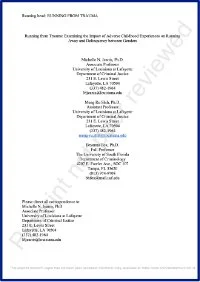Running from Trauma: Examining the Impact of Adverse Childhood Experiences on Running-Away and Delinquency between Genders
By Michelle Jeanis, Meng Ru Shih, Bryanna Fox
Background: Studies have shown that Adverse Childhood Experiences (ACEs) greatly effect negative life outcomes, especially delinquency. However, some variables and their roles remain elusive, and pathways to delinquency have not been fully explored.
Objective: The study proposes to (1) identify whether running away is an initial delinquency or a result of ACEs, (2) examine the similarities and differences of chronic and one-time ACEs on gender and delinquency and (3) further examine the role of exposure to violence by gender.
Participants and Setting: The study uses the public accessible data in the National Longitudinal Study of Adolescent to Adult Health (Add Health).
Methods: The study used factorial logistic regression models to analyze the ACEs and their influence on juvenile behavior.
Results: Chronic neglect (Female: β=.74; Male: β=.43) and multiple exposures to violence (ETV) (Female: β=1.43; Male: β=.94) were significantly related to reporting property crime in both genders. Gender differences are apparent. Girls who reported single-time physical abuse (β=1.93) and multiple ETVs (β=3.19) are more likely to commit violent offenses. Also, multiple ETVs (three types: β=2.123; four types: β=3.38; five types: β=3.90) are most significant for explaining violent offending among boys. Runaway behavior functions as a condition to the occurrence of juvenile offending, rather than a predictor.
Conclusions: ACEs typically affect boys and girls differently. Running away appears to shape the delinquency experience but does not fully mediate it. Policy implications are discussed.
Unpublished paper, 2024.


